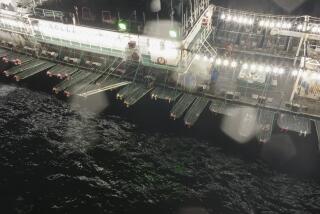Greece’s New ‘Sea Wolves’ Opt for Practicality Over Glamour : Shipping: Despite the flashy legacy of Onassis and Niarchos, today’s tycoons are making their fortunes with caution and computer sense.
PIRAEUS, Greece — They were the Golden Greeks, fiercely independent men who controlled the world’s shipping, built lush island paradises and married society’s most glamorous women.
Aristotle Onassis, Stavros Niarchos and their contemporaries are still revered in Piraeus, base of the powerful Greek shipping industry. But today a new tycoon is succeeding them: the young businessman who shuns publicity and knows computers as well as compasses.
“Twenty years ago, a shipowner was treated like a god,” said Diamantis Diamantides, who controls 25 ships. “Now he’s a simple person.”
The Greek shipping tradition is thousands of years old, a product of the country’s entrepreneurial talent and its kinship with the sea, which is within 50 miles of almost any part of Greece.
The legend of the Greek tycoon began earlier this century with the “sea wolves,” sea captains who acquired fleets. It reached its personification in Niarchos and Onassis, volatile, dynamic magnates with business savvy and a gambler’s touch, whose lives and loves were chronicled on the front pages of the world press.
Many of the newer managers have maintained their predecessors’ passion for the sea and their strong preference for family-run firms. But they are increasingly making longer-term investments, imposing modern business practices and buying newer, high-tech ships.
“We’re tending toward structured companies in corporate form as opposed to personality-driven, Onassis-type companies,” said Emmanuel A. Vordonis, director of Thenamaris Ships Management Inc.
Until recently, Greeks owned the world’s largest merchant fleet. The Japanese are now No. 1, but Greece is close behind, with 82 million tons of cargo-carrying capacity, according to the authoritative shipping magazine Naftiliaki.
Some of the change of style in owning Greek ships is due to the crisis that hit the industry from 1975 to 1987, stemming from overbuilding of ships and competitive freight-rate cutting at a time of stagnating world trade. This bustling port near Athens is still haunted by memories of proud shipowners losing their vessels to creditors.
Diamantides, 42, who began buying ships in 1975 after working in shipping offices, says old-time magnates could get bank loans on the strength of their names.
“Now you have to convince them with your figures,” he said.
Business practices also have changed with the infusion of a different kind of shipowner--either entrepreneurs from industry or construction attracted by a potential fortune, or the children of traditional shipowners, who have received advanced degrees in business or engineering at British or American universities.
“The new generation of managers has a different investment approach,” said Dimitri Krondiras, the local director of Citibank, the major lender for Greek ship purchases. “This new generation perceives that investment in shipping is high-risk.”
Because of that gamble, some shipowners have diversified into oil, banking or hotel chains. Others are trying to cater more to the changing market, purchasing newer, more customized ships.
A few shipowners are even beginning to raise money by opening their companies to outside investment and floating shares on the stock market --previously “a kind of heresy in Greek ship owning,” says George Anastassopoulos, the former head of the Transport Commission in the European Parliament.
One example of the new Greek tycoon is Thanasis Martinos, whose family founded Thenamaris. Hailed as the “Mozart of shipping” for his precociousness, Martinos entered the business as a teen-ager when his mother and her brothers--a shipping lawyer and a sea captain--bought their first ship.
Martinos worked with the firm while studying economics in London. Now 40, he and his two brothers head Thenamaris, which runs 55 ships itself and manages about 20 for other people.
Vordonis, the director of the firm, says the older generation “had the risk approach, the hard-work approach, the entrepreneurial approach to bringing resources together that were difficult to bring together.”
Now, he says, shipowners rely on high-speed information relayed by computers, tight cost control and a team approach.
Where old-style magnates used to make most decisions, sometimes screaming down cowering subordinates, the modern entrepreneurs are trying to attract and rely on technical experts to keep up with a fast-moving, efficient, more high-tech field.
“In order to achieve, you need technology, modern management techniques,” Vordonis says. “You go into how to manage people.”
A glance at the Thenamaris offices illustrates the change. Unlike the traditional rough-and-tumble offices tucked along the Piraeus waterfront, Thenamaris is a gleaming, glass-and-concrete ring in a lush coastal suburb. Sunlight pours into an airy core; water trickles through leafy plants in a central atrium.
“We have round tables, where everyone feels equal. We tried to make it as friendly as possible,” Vordonis says. “In addition to achieving efficiency, you must have people working in a high tone.”
In addition to keeping a lower profile at the office, the new tycoons avoid publicity in their private lives. Gone are the days when Niarchos and Onassis competed in the public eye, building ever-bigger yachts and purchasing islands they turned into paradises with imported trees and exotic birds.
Onassis dominated gossip columns through his affair with opera singer Maria Callas and later his marriage to Jacqueline Kennedy, while Niarchos married, among others, Charlotte Ford, daughter of auto maker Henry Ford.
Today’s shipowners keep elegant villas with swimming pools in Athens’ northern suburbs and vacation getaways on the Greek islands, as well as homes in London, Switzerland or Monte Carlo.
But they are content to stay out of the spotlight.
More to Read
Inside the business of entertainment
The Wide Shot brings you news, analysis and insights on everything from streaming wars to production — and what it all means for the future.
You may occasionally receive promotional content from the Los Angeles Times.










